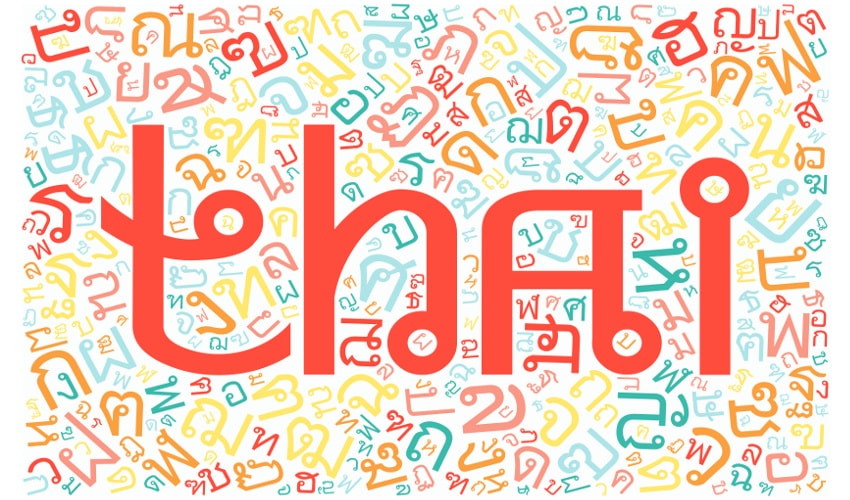![]()
Probably the first thing that overwhelms visitors and newcomers to Thailand is how completely alien the language is.
Most westerners have been exposed to enough Latin and Germanic languages to work out some words or phrases when we travel.
Some of us studied widely spoken languages like Spanish, French or German in high school or college. An increasing number of us learn Asian languages like Chinese or Japanese. But, I wager a fair sum that none of us had ever heard Thai, or Laos or Khmer until we landed on these sun-drenched shores.
Thai is a tonal language with its own alphabet that is spoken nowhere but in Thailand. It is nearly impossible to prepare for.
So after you get here, exactly how much do you need to learn?
I know guys that dive in head first, immersing themselves in the language and culture up to their neck. I know guys who have lived here for three decades and can’t count to five or ask where the toilet is in the Thai language.
The truth is, if you live in a well-developed area like Bangkok, Chiang Mai, Phuket, Pattaya or any of the tourist hotspots, you could get by speaking no Thai whatsoever. However, if you manage to master as little as ten phrases in Thai, your life here will become immeasurably more enjoyable.
I put language skills in the same category as musical proficiency. Almost anyone can learn to play simple songs on an instrument with a little effort and practice.
Some people struggle just to eek out “Twinkle Twinkle Little Star”. Others sit down at a piano and play Beethoven within six weeks. (I secretly hate those people). And as with music, learning a language is an endeavor that is easy to become discouraged by and eventually quit.
But you should try. Not only is it a nice gesture to our host nation, but your experience here in Thailand will be more rewarding and meaningful. If you don’t at least learn a handful of Thai phrases, you will always be a tourist.
With that said, what is the preferred method?
Exactly how does one learn the Thai language?
Following are a few helpful hints I’ve thrown together after crashing and banging my way through the process for the past two decades.
What not to do
Do not learn Thai from your bar girl/boyfriend. Not unless you want to sound like them.
It should go without saying that folks in this line of work generally don’t utilize the most polished version of the language. What’s more, you’ll probably learn more slang, Lao and Khmer than real Thai. And remember, Thai is a “gender specific” language.
Women use different words than men. Learning Thai from an Issan bargirl will mean you sound like an Issan bargirl when you open your mouth.
Do not learn Thai from a foreigner.
There are countless Thai-speaking farangs with courses and websites to choose from but you shouldn’t bother with any of them. Going this route will have you mimicking Thai instead of understanding what is being said and what you are saying.
Do you think a Thai should learn English from another Thai or a native English speaker?
Case closed.
Act like a baby
How did you learn to speak your native language?
You observed your parents and family members until you started making connections between sounds and objects or actions.
Many people think the first words they learned were “mama” or “da-da” when in fact it was probably the word “no”.
It was the first piece of language directed at you with reinforced action … “no, don’t touch that … no, don’t do that … no don’t put that in your mouth”.
Until I was 4 years old I thought my name was “no”. You should learn Thai like a baby.
Watch Thai movies and television with no subtitles and try to figure it out. Sit in on Thai conversations, listen attentively and try to figure out words and phrases.
Ask a few questions … then listen some more.
It’s how you learned your first language, why wouldn’t it work on Thai?
Collect Lexical Sets
A lexical set is a group of words pertaining to a particular setting or situation.
When people ask me if I speak Thai I say “sometimes”.
My restaurant Thai is great. My taxi Thai flawless. You should learn all the words and important phrases for specific situations. Restaurants, airports, police encounters, banking, directions, etc.
Learning words and phrases you’ll never use is pointless and discouraging. Figure out what you need and learn that first. Then you can add lexical sets as you find them necessary.
Altogether now
If you opt to take a formal Thai class I have two recommendations.
First, take private classes. Yes, it is exhausting but you will get much more out of a one on one arrangement.
Second, learn to read, write, speak and listen all at once.
According to language experts, committing to six months of this kind of language learning is worth five years of just learning how to speak. This is also the preferred method for teaching non-English speakers English.
Lay down a base
Back when I was in the military, we’d get an in-briefing when we were assigned to a new country.
All new arrivals had to learn how to say “hello”, “please” and “thank you”.
We had to learn how to count to ten, say “left” “right” and “stop” to direct a taxi.
We learned “pork”, “chicken”, “beef” and “fish” to order food. And most importantly, we learned to say “where is the toilet”.
As it turns out, that’s about all you really need. I recommend you do this for Thai and build on it a little every week.
The number one thing to remember is don’t listen to people who say you don’t need to learn Thai.
Don’t listen to people who say you are too old to learn another language.
Learning ten phrases in Thai will make your experience here in the land of smiles 100% better.
By Bart Walters












